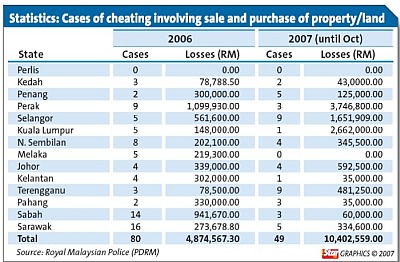|
Indefeasibility means
impossible to be defeated
23/12/2007 Sunday Star
THE term indefeasibility means that something is impossible to be ‘defeated’
or made void.
Where fraud or forgery is involved in the transfer of land titles, legal
systems around the world adopt either one of two principles – “immediate” or
“deferred” indefeasibility. Which one is practised depends on the laws of
the respective countries.
Immediate indefeasibility is a situation where a transferred title is valid,
regardless of any element of fraud or forgery involved. Countries such as
Australia or Canada practise this, and their respective governments have in
place a fund that compensates victims of such cases.
Deferred indefeasibility, on the other hand, only protects a subsequent
purchaser to a title that is defeasible. Therefore, if one party obtains a
title where fraud or forgery is involved, this title can be defeated.
However, if this same party sells it to another purchaser who buys it on
good faith, that title is considered to be indefeasible. The indefeasibility
therefore “defers” across one transfer of title (the one where fraud or
forgery is involved) to the next purchaser who buys it in good faith.
Indefeasibility under the National Land Code 1965
The relevant parts that concern the principle of indefeasibility in Malaysia
is spelt out in Section 340 of the NLC as follows (omissions made for
brevity)

Section 340. Registration to confer indefeasible title or interest, except
in certain circumstances.
(1) The title or interest of any person or body ... shall, subject to the
following provisions of this section, be indefeasible.
(2) The title or interest ... shall not be indefeasible -
(a) in any case of fraud or
misrepresentation ... or
(b) where registration was
obtained by forgery ... or
(c) ...
(3) Where the title or interest of any person or body is defeasible by ...
circumstances specified in sub-section (2)-
(a) it shall be liable to be set
aside ... to whom it may
subsequently be transferred; and
(b) any interest subsequently
granted thereout shall be
liable to be set aside ... :
Provided that nothing in this sub-section shall affect any title or interest
acquired by any purchaser in good faith and for valuable consideration....
(4) ...
Briefly explained, 340(1) says that all titles are indefeasible, and 340(2)
states that fraud or forgery, amongst other things, can render the title
defeasible.
340(3) states that if a defeasible title – as explained in the 340(2) – is
sold to a subsequent purchaser, it remains defeasible.
However, 340(3) has something known as a proviso (an exception to the rule),
and it says that if the subsequent purchaser buys it in good faith, (i.e.,
thinking that the title was valid and the deal fully legitimate) and paid
for it (in money or otherwise), then the title will be indefeasible, and he
gets to keep the land – and this essentially spells out the concept of
‘differed indefeasibility'.
The point of contention here is that the proviso appears to limit itself to
‘this sub-section', which might be taken to apply to 340(3) only.
Many legal practitioners and academicians are of the opinion that the
Federal Court did not arrive at the correct decision in Adorna Properties
Sdn Bhd v Boonsom Boonyanit.
According to assistant professor Dr Sharifah Zubaidah Syed Abdul Kader,
there appears to be nothing wrong in the way S340 of the NLC is worded.
“The law is fine, but it is how the judges have interpreted it. If you were
to read the Court of Appeal's decision, it appears that the Federal Court
made its decision on the wrong premise. There was no reason for it to depart
from the practice of differed indefeasibility,” she opines.
|